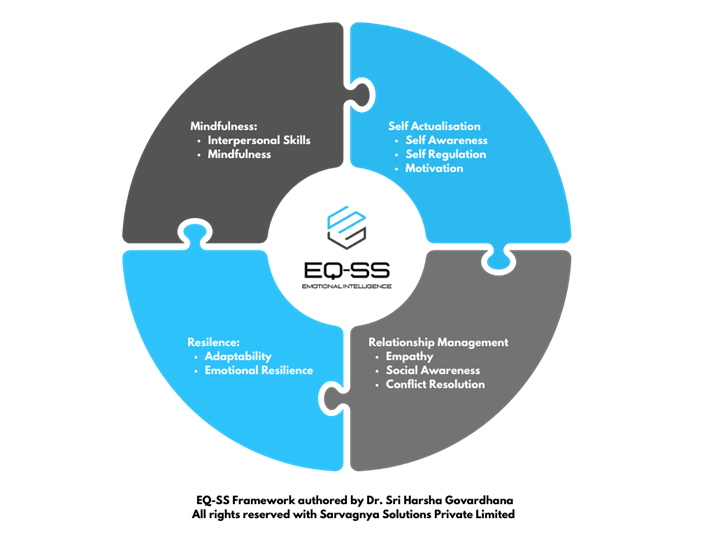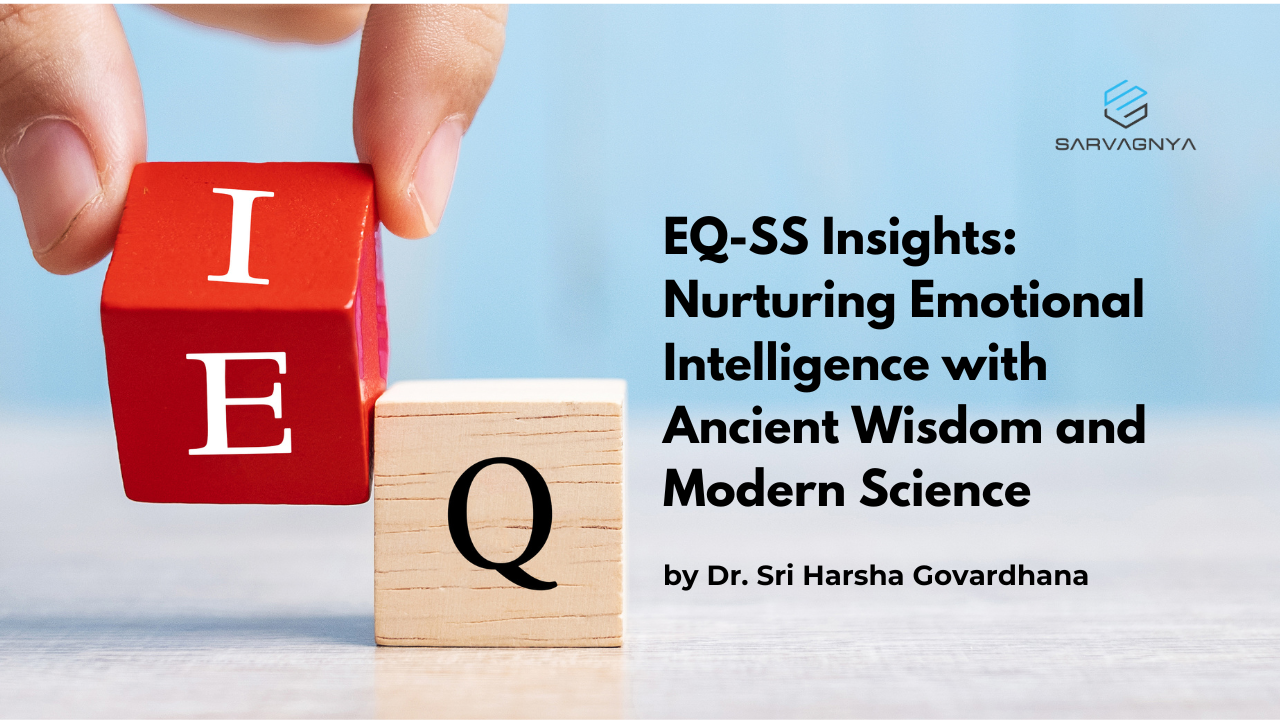In today’s fast-paced corporate world, the importance of Emotional Intelligence (EI) cannot be overstated. Leaders and employees who possess high EI are better equipped to navigate challenges, build strong relationships, and inspire teams to achieve success.
Drawing inspiration from timeless epics like the Ramayana and Mahabharata, as well as pioneering work on emotional intelligence by Peter Salovey, John Mayer, and Daniel Goleman, EQ-SS authored by Dr. Sri Harsha Govardhana emerges as the assessment tool that provides invaluable insights into EI.
By blending the profound lessons from ancient epics with contemporary EI research, EQ-SS offers a holistic approach to understanding and developing Emotional Intelligence.
Let’s explore how these insights can transform leadership and organizational culture in the modern workplace.

Self Actualisation:
Self Actualisation encompasses the foundational elements for personal growth and achievement. It involves understanding oneself (self-awareness), managing one’s emotions effectively (self-regulation), and staying driven to attain goals (motivation).
Example from Ramayana:
In the Ramayana, Lord Rama epitomizes self-awareness when he reflects on his duty as a prince and later as an exile. Despite facing numerous trials, Rama demonstrates self-regulation by maintaining his composure and adhering to his principles. His unwavering motivation to uphold dharma and rescue Sita serves as a powerful example of self-actualization for leaders striving to align personal values with professional responsibilities.
Example from Mahabharata:
Similarly, Arjuna from the Mahabharata showcases self-actualization as he grapples with moral dilemmas on the battlefield of Kurukshetra. Despite his initial doubts and fears, Arjuna harnesses self-awareness to confront his emotions, self-regulation to maintain focus amidst chaos, and motivation to fulfill his duty as a warrior. His journey inspires leaders to cultivate inner clarity and purpose amid adversity.Relationship Management:
Relationship Management focuses on the dynamics of interactions with others, including recognizing and understanding the emotions of others (empathy), being attuned to social contexts (social awareness), and resolving conflicts effectively (conflict resolution).
Example from Ramayana:
Hanuman’s unwavering loyalty and empathy towards Lord Rama exemplify relationship management in the Ramayana. When Hanuman encounters Sita in captivity, he skillfully navigates the emotional nuances of their interaction, offering comfort and reassurance while conveying Rama’s message. His empathetic understanding of Sita’s plight and strategic communication skills demonstrate the importance of building trust and rapport in interpersonal relationships.
Example from Mahabharata:
In the Mahabharata, Krishna serves as a masterful leader in relationship management, adept at navigating complex social dynamics and resolving conflicts diplomatically. Krishna’s role as a trusted advisor to the Pandavas and his efforts to broker peace between conflicting factions highlight the significance of empathy, social awareness, and conflict resolution in fostering harmonious relationships within teams and organizations.Resilience:
Resilience centers around adaptability and emotional resilience, emphasizing the ability to navigate change (adaptability) and bounce back from challenges (emotional resilience).
Example from Ramayana:
Sita’s resilience in the face of adversity symbolizes emotional resilience in the Ramayana. Despite enduring separation from her beloved Rama and facing captivity in Lanka, Sita maintains her inner strength and dignity. Her unwavering faith and resilience inspire leaders to cultivate emotional fortitude and persevere through trials and tribulations in the corporate world.
Example from Mahabharata:
Arjuna’s journey of resilience amidst personal and professional upheavals in the Mahabharata serves as a timeless lesson for leaders. From his exile in the forest to the trials of the Kurukshetra war, Arjuna displays adaptability by embracing change and emotional resilience by overcoming setbacks with courage and resilience. His resilience underscores the importance of staying resilient in the face of adversity and emerging stronger from challenges.Mindfulness:
Mindfulness entails mindful and intentional interactions, including effective communication and relationship-building skills (interpersonal skills), as well as the practice of staying present in the moment and making thoughtful decisions (mindfulness).
Example from Ramayana:
Lakshmana’s unwavering devotion and mindfulness towards Lord Rama exemplify the power of intentional actions in the Ramayana. Whether accompanying Rama into exile or guarding Sita in the forest, Lakshmana demonstrates mindful awareness of his duties and responsibilities, embodying the essence of selflessness and commitment in leadership.
Example from Mahabharata:
During the Kurukshetra war in the Mahabharata, Arjuna faces a profound crisis of conscience and loses clarity about his duty as a warrior. In the Bhagavad Gita, Lord Krishna imparts timeless wisdom to Arjuna, reminding him of the importance of mindfulness in action. Krishna advises Arjuna to perform his duty (dharma) with full awareness and without attachment to the outcomes. Through this teaching, Arjuna learns to cultivate mindfulness by focusing his attention on the present moment, thereby regaining his composure and resolve to fulfill his role as a warrior. In times of uncertainty or moral dilemma, leaders may experience doubt and confusion; therefore, leaders can emulate Arjuna's willingness to seek guidance and wisdom from mentors or trusted advisors, recognizing that mindfulness involves not only self-awareness but also humility and openness to learning.
Conclusion
As we reflect on the timeless wisdom embedded in the ancient epics of the Ramayana and Mahabharata, as well as the pioneering work on emotional intelligence by Peter Salovey, John Mayer, and Daniel Goleman, we find invaluable lessons for nurturing Emotional Intelligence in the modern workplace. By embodying the principles of self-actualization, relationship management, resilience, and mindfulness, leaders and employees can cultivate deeper self-awareness, foster meaningful connections, navigate adversity with grace, and lead with clarity and compassion in an ever-changing world. As we integrate these timeless teachings into our corporate ethos, we pave the way for a more empathetic, resilient, and mindful approach to leadership and organizational success.To take the EQ-SS assessment and get a colourful report with invaluable insights, Click here Dr. Sri Harsha Govardhana
Email: sriharsha@sarvagnya.in, WhatsApp +91-9866020302 or +91-9577243333.

